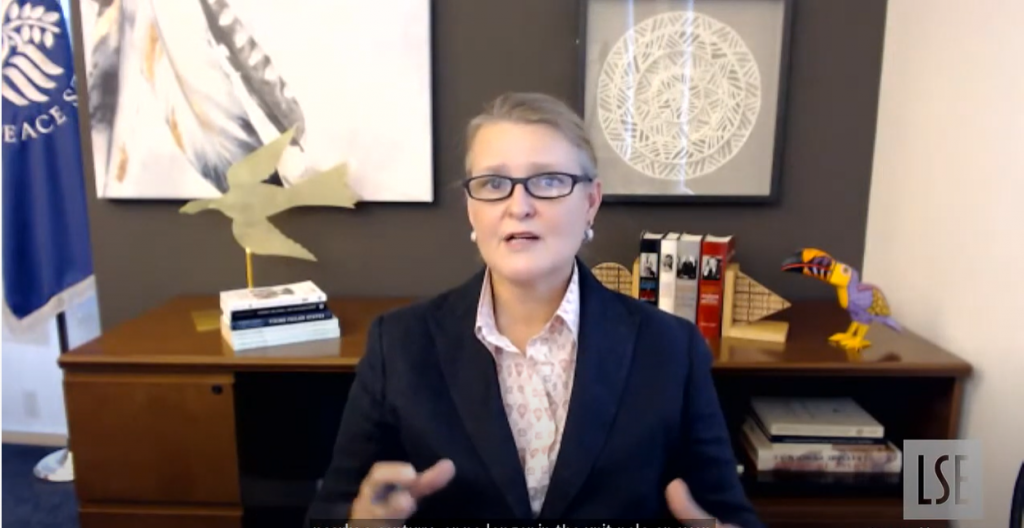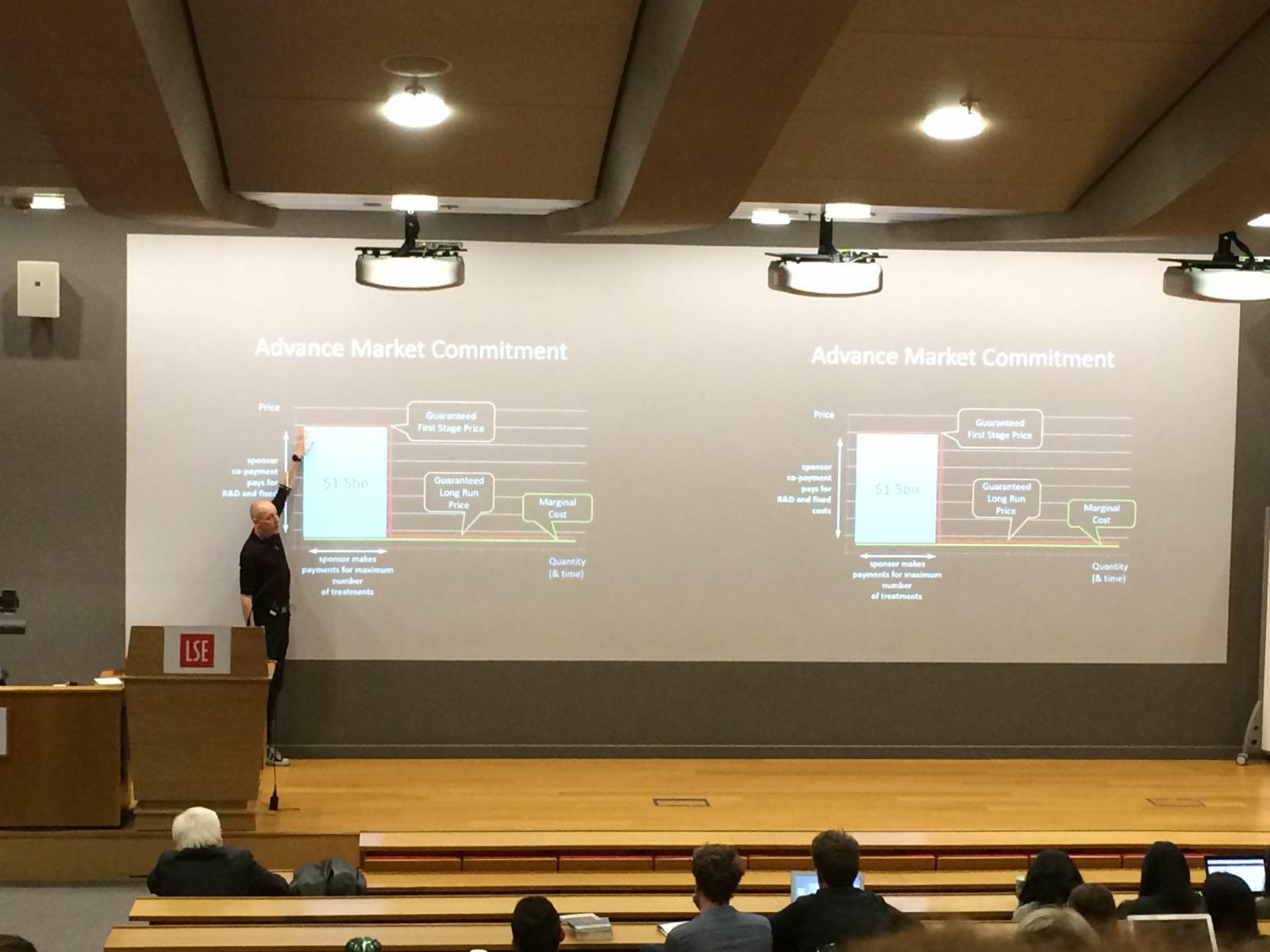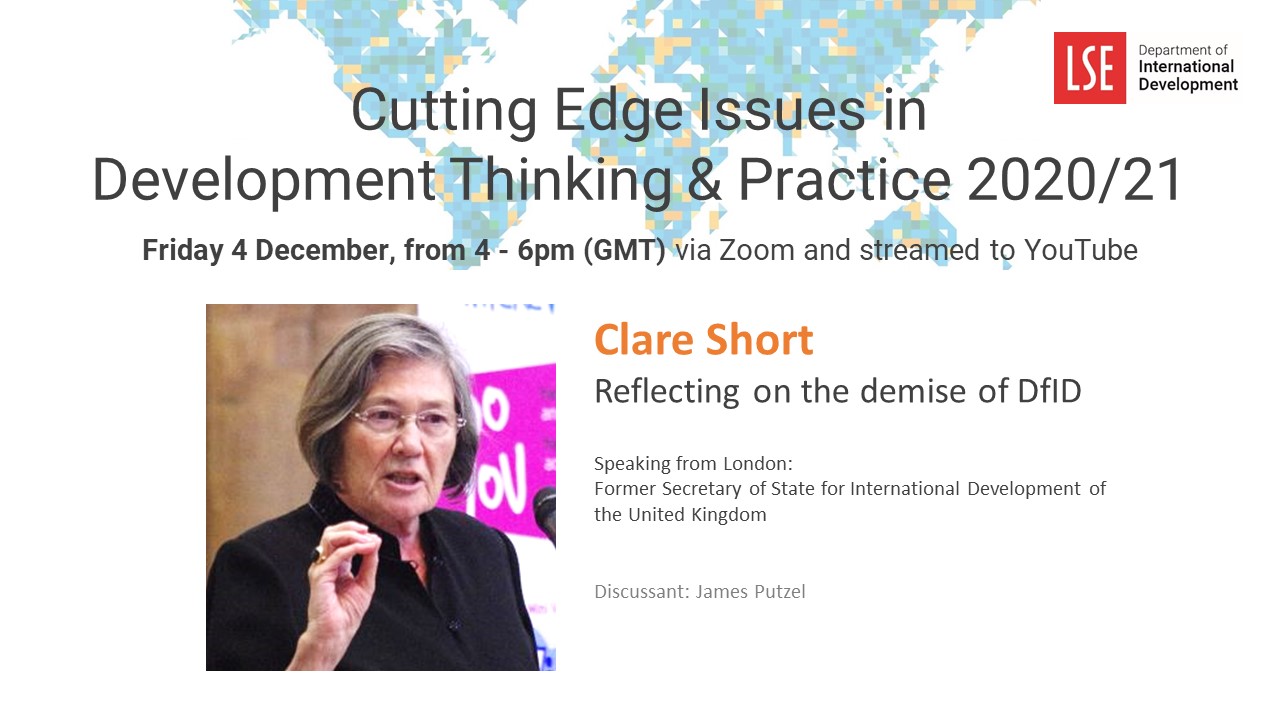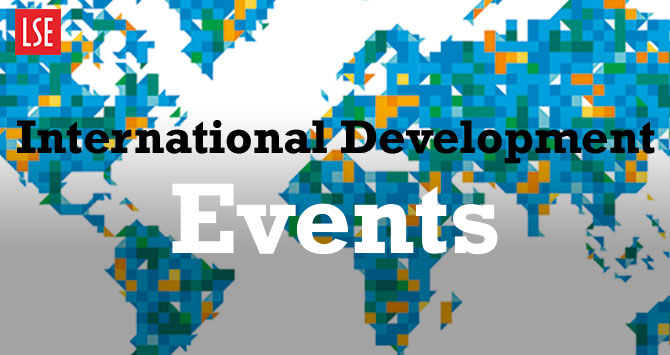On Friday 4 February, Lise Grande gave an online lecture on ‘Peacebuilding in Today’s World’ as part of the Cutting Edge Issues in Development Lecture Series for 2021/22. Lise Grande is President and CEO of the U.S. Institute of Peace and has 25 years of overseas experience leading, managing, and coordinating complex operations for the United Nations. The discussant for this lecture, David Keen is Professor of Conflict Studies, LSE Department of International Development. Read what MSc students Shanyce Morris and Juanita Camacho took away from the lecture below.
You can watch the lecture back on YouTube or listen to the podcast.

One of the big questions addressed in the Cutting-Edge Issues Lecture last Friday was what does the future look like for international conflict and security?
The lecture began with Lise Grande succinctly describing the proliferation of threats the global community faces within the next quarter-century that could lead to global, regional, or local conflict. This included great power rivalry between the rising powers of China and Russia and the United States; the spread of authoritarianism, extremism, and terrorist networks; and lastly the impacts of climate change, specifically increasing resource scarcity and pandemics. She then discussed the tools available to address these threats including existing institutions for global peace and corporation and the normative framework of the existing international order.
The aspects of the lecture where Lise was able to draw on her vast professional experience to candidly discuss the state of the international system regarding conflict and security were the most eye opening for me, providing me with a new perspective on issues and concepts of conflict and security that I’ve engaged with during my academic career.
However, what struck me most about this lecture was the theme of how discourse has and will continue to shape responses to international security threats. This was highlighted by Professor David Keen who discussed how the presentation Lise gave on future global threats can create a discourse, largely driven by the Global North and their security institutions, that create securitized responses. He gave examples of the violence generated previously from the War on Terror, War on Communism and War on Drugs that all demonstrate when a discourse of a threat was used to securitize a different referent object (from communist states to illicit narcotics, to terrorist actors) and the immense human cost and destabilization of different regions generated through securitized responses to these threats and impunity for state actors who caused that destruction.
To me, these comments demonstrated the inherent risk of using a discourse to describe the future of international conflict and security as full of emerging threats as this could lead to a repetition of securitized practices from great powers such as the United States that caused destruction and destabilization in the past.
However, Lise’s response to questions posed by David Keen on this matter demonstrated to me that norms, and the international community and civil society upholding norms could be what prevents discourses of rising threats leading to destructive responses. Lise passionately described the role of norms preventing global catastrophe during the Cold War because of nuclear weapons and the importance of civil society challenging governments on their securitized practices and ensuring they do not act in ways that cause mass death and destabilization. These comments showed to me the importance of norms and the tangible ways they can restrain states from acting in destructive manners, as well as the role that we all play in making sure governments uphold these normative frameworks to ensure we witness a more peaceful global future.
Shanyce Morris
________________________________________________
Peacebuilding is a challenge. With a fast-changing world where new countries are gaining power and looking to expand their influence on other countries; with a greater threat of authoritarianism and extremist forces spread, particularly in certain countries with institutional weakness; and the threat of global issues such as climate change and resource scarcity, the risk of conflicts erupting across the globe is high. This is the view of Lise Grande, the president and CEO of the U.S. Institute of Peace. For her, these threats have made visible the current issues underlying the architecture of the world’s institutions for peace-keeping and non-violent conflict resolution. The ultimate question, according to Grande, is what changes do we need in these institutions to make it possible for these to continue maintaining peace in the world.
For the CEO, it is evident that change is happening in the world and institutions have shown to be rather stagnant in keeping up with these changes and increased risks; it is not completely evident that they can continue to secure peace via their conflict resolution mechanisms. The presentation by Grande largely showcased the activities for peacebuilding, and highlighted the 75-year track record in helping to reduce and resolve conflict via diplomatic, humanitarian and development engagement, actions by the private sector, and humanitarian aid.
After the main presentation by Grande, Professor David Keen made comments on the presentation and the risks introduced by Grande. Expanding on Professor Keen’s comments on the risks of a narrative that paints the world as a dire and frightening place, I want to talk about environmental “wars” and conflict in the rest of this blog.
For more than 15 years climate conflict has been a subject of international security. As Grande’s presentation reflected, it is definitely a key aspect in today’s peacebuilding agenda due to the prospect of wars led by resource scarcity. There are several examples of conflicts in recent years that have been framed as caused by environmental change all around the world. The issue with framing climate change and the consequences of it in catastrophic conflict-ridden contexts is that it depoliticizes the causes for environmental issues and the many causes of how a conflict is originated. In contrast, the narrative allows the portrayal of environmental issues as a security threat caused by climate change (for more on this subject, see Hartmann, 2010). This, as Professor Keen himself argued, can be used by political groups to create policies that may in fact do more harm to the people who have seen their lives disrupted, and serve the interests of some to increase militarization in these territories. A type of response that I can hardly understand as conflict-decreasing and yet, it does not look like the world may be headed to a different peacebuilding narrative.
As Professor Keen argued, “threat-based politics” having been shown to be very useful for some in creating policies that ultimately end up having severe negative consequences on already vulnerable people.
Lise Grande ended the discussion affirming that the great question today is how to make the architecture of peacebuilding work for the challenges of the current world, taking into account that these institutions were created 80 years ago under a very different global context. I think this is crucial to maintain peace in a world that now has many more ways of causing harm, but all countries must also be open to commit to non-violent methods, as well as to abide by treaties that apply equally to all. The interests of some cannot be treated as more important, or more “right”, than the interests of others.
Juanita Camacho
The next guest lecture will be with Isabella Weber on Friday 11 February 2022 on ‘How China Escaped Shock Therapy: The Market Reform Debate’. LSE Students, Staff and Alumni can register here. External audiences can join the lecture via YouTube.
The views expressed in this post are those of the author and in no way reflect those of the International Development LSE blog or the London School of Economics and Political Science.






Mientras hayan intereses particulares y ganancias en sectores que afectan los recursos naturales el conflicto existirá. Cómo llegamos a que los intereses colectivos estén primero que los de unos pocos?